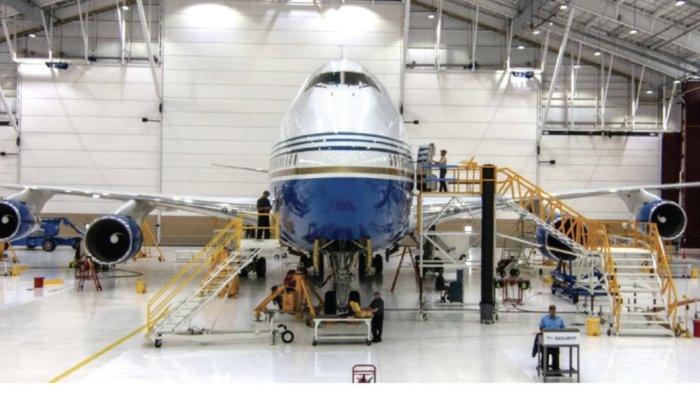Flightcraft’s roots go deep into the local community. The company began serving the lumber industry in the late 1940s when Si King, Charlie Miller and a couple of lumber companies, including Weyerhaeuser, got together to support the transportation needs of the lumber industry.
It was the heyday of the Beech 18, and the Flightcraft team sold and serviced the popular workhorse from its Portland Columbia Airport facility. The team operated Flightcraft out of PDX until the early 1970s, when Beech Holdings bought the company to maintain its Beechcraft Service Center. Less than a year later, in 1973, Vin Manilla and David Hinson bought Flightcraft from Beech Holdings, and Hinson stayed on until 1978, when he left to start Midway Airlines. Hinson eventually was appointed to head the FAA under President Clinton.
In the early 1980s Flightcraft was sold to Dean Pape, who started an aggressive expansion that would result in Flightcraft FBO and maintenance facilities in Portland and Eugene, Ore.; Spokane and Seattle, Wash.; and Hayward and Oakland, Calif. Over time, the company sold off all but the Portland and Eugene FBOs.
Brent Fraser, Flightcraft’s general manager, took a job with Flightcraft as a mechanic in 1999 but within a year moved for a position as a mechanic managing aircraft for ACM Aviation in Silicon Valley. He remained there until 2009. “I always kept my eye on Flightcraft because I felt it had significant potential,” Fraser said. “In the 1980s it was a robust company but it didn’t stand the test of time.”
Maintenance Growth Plan
In 2011 Atlantic Aviation acquired the company from the Pape Group and rebranded it Atlantic Aviation, but the maintenance operation continued to do business as Flightcraft. Fraser quickly realized that what Atlantic Aviation brought to the table was the drive to make the company all it had been and a lot more. By then, the company had moved out of its 1950s wooden-arch hangar and was occupying a new 68,000-sq-ft maintenance facility, so the infrastructure was conducive to growth.
“Through conversations with some friends, I became aware that Atlantic Aviation wanted to strengthen and build the maintenance, repair and overhaul portion of the business so I aggressively approached them about playing a key role in that effort. I always loved the area and the company; I watched them for 10 years waiting for such an opportunity to arise,” he said.
Atlantic Aviation brought in a maintenance consultant and Fraser laid out his thoughts about how to build the business. It turned out to be a good match and he became Flightcraft’s general manager.
“The day I walked in the door my singular goal was to make Flightcraft the only show around.” To do that, he drew on his experience as Hawker crew chief at the KC Aviation facility in Westfield, Mass., during the 1990s. He told AIN, “I was part of an aggressive program that saw that business grow from 10 employees to several hundred. It was done by extremely hard work, never saying no, and with the determination that if we weren’t able to specifically help a customer we made sure to find a way to get it done.” He employed the same strategy at Flightcraft and “the growth we’ve experienced to date underscores its importance,” he said.
The first thing he did was approach Hawker Beechcraft and expand the MRO’s relationship to be a service center for its entire product line other than the Hawker 4000. In addition, he built relationships with fractional providers to maintain their fleets. More recently the company has built its Part 91 maintenance management segment, attracting California-based aircraft “whose operators are looking for a place outside the state that is friendlier to business aircraft operations.”
Earlier this year Fraser partnered with Duncan Aviation to open a satellite facility. Duncan offers full avionics repair and installation. Duncan also located a TFE731 AOG support team at the MRO.
Flightcraft is part of a main facility supported by a freshly remodeled Atlantic Aviation FBO. The MRO currently has branded three maintenance facilities: the flagship operation in Portland, one in Eugene, Oregon, and its latest addition in Casper, Wyo.
“What we’ve managed to do in the almost two years I’ve been at Flightcraft is substantially strengthen our economic position, significantly streamline our operational efficiency and increase our market share in the northwest region,” Fraser said.
The company has service center designations for Cirrus and Hawker Beechcraft (up to and including the King Air line). It also provides service for older aircraft that are out of warranty.
Today, Flightcraft’s facility includes 38,000 sq ft of hangar space, back shops and office space. It has 22 employees, including 10 dedicated A&P mechanics. The MRO offers aircraft modification and upgrade; Part 91 aircraft management; inspections and pre-purchase inspections; and aircraft structural and engine repairs. Its primary product lines are the King Air and Hawker 125 series; Citation 500 series; Falcon 10, 20 and 50; and Cirrus. The company’s AOG road team covers the northwest region. “The majority of our AOG trips are to service fractionals, but we’ll also service customers that are not fleet operators,” Fraser said.
The FAR Part 145 repair station is a Hawker/Beechcraft authorized service center, Cessna Citation certified repair station, Cirrus authorized service center, Williams authorized service center and has substantial experience with Pratt & Whitney Canada engines and older Falcons.
“We are constantly expanding our knowledge and training to serve our customers better. We have recently added to our team and are now focusing on the future through stronger marketing and customer relations,” Fraser said. “This approach will better inform our customers about our capabilities, maintenance specials and allow better communications with potential customers looking for a new service provider. As our branded facilities grow in number and capabilities, it will allow us to remain competitive as well as offer a higher level of service to all our customers nationwide.”







